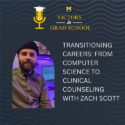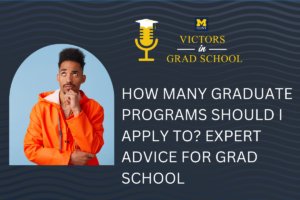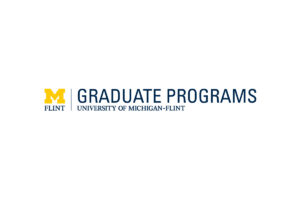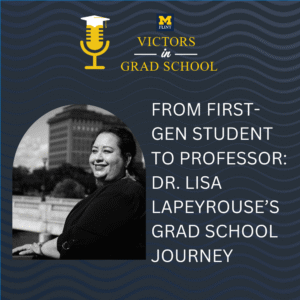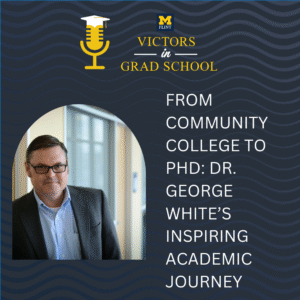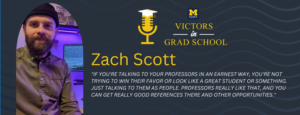
In the latest episode of Victors in Grad School, we sit down with Zach Scott, a graduate student at Oakland University studying Clinical Counseling. Zach’s educational and career journey offers a compelling story of transformation and introspection, making this episode a must-listen for anyone contemplating the value of following their passions, even if that means pivoting away from a well-established career path.
From Computer Science to Counseling: A New Direction
Zach Scott’s journey is a prime example of how one’s path toward fulfillment can often be winding and unexpected. After earning a bachelor’s degree in both English and Computer Science from the University of Michigan Flint, Zach entered the world of web development and computer science, where he spent several years. Despite the creative and intellectually stimulating nature of computer science, Zach found himself increasingly dissatisfied.
“I wasn’t as enthused about it as I had been before,” Zach reveals. It wasn’t just the isolated, anti-social nature of coding that contributed to his growing disillusionment; it was the deeper realization that he craved more meaningful interactions with people. The turning point came during the pandemic, when Zach engaged in frequent, deep conversations about job fulfillment and well-being with his colleagues. This experience illuminated his true call: to help others in a more direct and profound way through counseling.
Choosing the Right Graduate Program
Pivoting towards a completely new career is a monumental decision, one that demands thorough consideration and research. For Zach, the tipping point was a recommendation from his own therapist, who graduated from Oakland University. Unlike those who meticulously compare programs, Zach confesses he relied largely on his gut feeling. A significant factor was the philosophical approach to counseling that the faculty at Oakland University employs, catalyzing his decision to apply there.
Dr. Christopher Lewis, the podcast host, emphasized the breadth of graduate programs available today, ranging from in-person to hybrid and fully online modalities. Zach opted for an in-person program to foster genuine connections with his peers and professors, something he feels is crucial for his own learning style and well-being.
Transitioning Smoothly: Setting Yourself Up for Success
Transitioning back into academia after a hiatus can be daunting, but Zach shares practical tips that smoothed his journey. One of his key strategies was starting slow: “My first semester, I only took one class,” Zach explains. This allowed him to immerse himself fully in the course material without feeling overwhelmed, essentially easing him back into the rhythms of academic life.
For those looking to emulate Zach’s success, he suggests embracing a slower pace, engaging deeply with the material, and finding a personal connection to your field of study. Instead of treating the curriculum as a mere list of requirements, see it as an opportunity to delve into subjects that truly ignite your passion.
Leveraging Past Experiences
Zach’s diverse academic and professional background has proven to be an invaluable asset in his new field. His English degree, centered around literary analysis, has refined his ability to discern deeper meanings and symbolic narratives in his counseling sessions. Zach’s computer science expertise equips him with strong problem-solving skills, enabling him to identify patterns and root causes, a crucial skill in psychotherapy.
Building Connections: The Importance of Networking
One of the standout pieces of advice Zach offers revolves around the necessity of building genuine relationships during your graduate studies. “Be friendly,” Zach urges. Whether it’s classmates or professors, forming meaningful connections can profoundly enrich your academic experience. The friendships and professional networks you build can offer support, provide opportunities, and even lead to job prospects.
Embracing Your Unique Path
As Zach reflects on his past and looks to the future, he underscores the importance of trusting your own intuition and following your unique path. “It’s okay to change your mind,” he says, reassuring listeners that fluctuating between interests and making career pivots isn’t a sign of failure, but a hallmark of personal growth.
In closing, Zach’s journey from computer science to clinical counseling serves as a compelling reminder that graduate school isn’t just an academic endeavor but a deeply personal journey. By following one’s passions and remaining open to change, students can transform both their careers and their lives.
For those pondering a return to academia, Zach Scott’s story encourages you to examine your passions closely and take the leap—your true calling may be just around the corner.
TRANSCRIPT (unedited transcript made with help of CASTMAGIC)
Dr. Christopher Lewis [00:00:01]:
Welcome to the victors in grad school, where we have conversations with students, alumni, and experts about what it takes to find success in graduate school.
Dr. Christopher Lewis [00:00:11]:
Welcome back to victors in grad school. I’m your host, Dr. Christopher Lewis, director of graduate programs at the University of Michigan, Flint. Really excited to have you back again this week. Every week, I love being able to sit down, talk to you, work with you as you are going through this graduate school journey that you’re on. You might be just at the beginning where you’re just starting to think about putting that application in. You might be actually accepted and ready to get going. You could be in grad school and seeing that light at the end of the tunnel. No matter where you are, you are on a journey.
Dr. Christopher Lewis [00:00:44]:
There are things that you can do to be able to be successful in the journey that you’re on. Things that you can start right now. And every week I love being able to bring you different people, different people with different experiences that have gone through graduate school or are in graduate school. And they’ve had experiences that can help you to be able to better understand the experience that you’re gonna be stepping in no matter what that journey may be. This week we’ve got another great guest. Zach Scott is with us. And Zach did his undergraduate work at the University of Michigan Flint. He did a bachelor’s degree in both English and computer science, and is now in a graduate program at Oakland University studying clinical counseling.
Dr. Christopher Lewis [00:01:28]:
We’re We’re gonna talk about the journey that he has been on. And we’re going to learn a little bit more about him as well. So I’m really excited to have him here today to be able to share his journey with you. Zach, thanks so much for being here today.
Zach Scott [00:01:40]:
Hi. Thank you for having me.
Dr. Christopher Lewis [00:01:41]:
I am really excited to have you here. And one of the things that I love doing as we start these conversations is really turn the clock back because I know that you did your undergraduate work at the University of Michigan Flint. And then after getting that bachelor’s degree in English and computer science, you went out. You went out and you started a career. You started a career doing work in different types of work in computer science. And at some point, you made a decision. You made a decision that you wanted to change paths. You wanted to pivot.
Dr. Christopher Lewis [00:02:18]:
You wanted to move in a different direction, and you wanted to continue your education. Tell me about that point. And what made you decide that it was time to go to graduate school, and what made you decide that you wanted to completely change directions?
Zach Scott [00:02:31]:
After I finished my undergrad, I went and just got a bunch of jobs in computer science. I worked with mainframes, and I did a lot of web development. I’ve mostly been a web developer, and that work can be really creative and it can be really interesting work. But after a while, I just sort of noticed that I wasn’t as enthused about it as I had been before. I think part of it was learning. When you start your career, you don’t exactly know what in a career is fulfilling to you because you haven’t had a lot of opportunities to try things, see what works, what doesn’t. So you’re kind of assuming, well, I’m gonna like this I think. I’ve liked everything I’ve studied, and you sort of plunge into it.
Zach Scott [00:03:08]:
And, again there’s a lot of things I like about computer science, but something I started to notice was I wasn’t really getting a chance to talk with people very much. I like interacting with people, and in programming it can be really antisocial. And when the, pandemic hit, everyone was just working from home. So I noticed I was spending a lot of time at work having meetings with people and saying, you know, is this job fulfilling to you? Like, how can we have, like, a more enjoyable atmosphere? And I was having a lot of conversations with people, and I started doing that more than writing code and working on technical problems. And as I was approaching my 30th birthday, I really did not feel very good. I was really I felt really, like, a bit aimless and a bit I just didn’t think my work was really, energizing me. And I was listening to a talk by a a guy named James Hollis. He’s a psychotherapist that I really respect.
Zach Scott [00:04:02]:
And he was sort of talking about the midlife crisis feeling and finding what you’re called to do. And the way he framed it, I was like, yeah. I really need to, like, sit and consider this question. Like, it’s not just going I’m not just going to fall into the thing that’s meaningful for me. I have to reflect on it. And so I started reading into psychotherapy a lot because I’ve benefited from psychotherapy in a lot of really deep ways. And I just sort of had an epiphany. I was like, oh my god.
Zach Scott [00:04:27]:
I could do this. Like, there’s I spend most of my days talking to friends and family members about life and and mental issues that we face and these types of things, and that’s my favorite place to be. That’s my favorite kind of conversation to have right now. So I was like, yeah. I can go back to school. I always have enjoyed studying. I study all the time just for fun. I like to read a lot.
Zach Scott [00:04:50]:
So it just sort of clicked for me. And I talked to my therapist. He told me that he went to Oakland, and so I applied for the program there.
Dr. Christopher Lewis [00:04:58]:
Well, you kind of answered my next question, which was there’s lots of programs that are out there, and you could have applied for clinical counseling in a lot of different places, and you chose Oakland University. And it sounds like you were pushed to that through a recommendation from your own therapist and wanting to move into that. But were were there any other factors, any other things that you were looking for in a graduate school, and what you were trying to get out of that program that made you decide that Oakland was the right fit?
Zach Scott [00:05:28]:
Other people are gonna be completely different here. And this is going against conventional wisdom, but I don’t shop around very much, honestly. I don’t. I just don’t. It stresses me out when I have a bunch of choices to pick from. I usually go with my gut, and I go with, like, I like the symbolic choice. So for me, it was like my personal therapist went here, and he was telling me all about faculty there. And some of the professors he told me about, I really liked what I was hearing, and I liked that they had a philosophical approach to counseling.
Zach Scott [00:05:59]:
And so I thought, okay. This is really first of all, it’s not that far of a drive because I live in Ferndale right now. So it it I wanted it to be close so that I could visit in person. That was what was really important to me was being able to make it there in person. So I needed some place close, and I liked the idea that my own therapist could vouch for it. And I knew that no matter what other option, I if I shopped around, I wouldn’t have, like, a personal connection to that place, and that was important to me.
Dr. Christopher Lewis [00:06:25]:
So as you decided to go back to school, as you transition from going from work and a number of years not being in school, it’s definitely a transition as you enter back into, let’s say, school mode. So talk to me about that transition and what you had to do to set yourself up for success at the beginning of the experience and what you’ve had to do throughout this experience to be able to maintain that success, especially as you have transitioned, 1, from being out of school for a while, but 2, transitioning into a program that is very different than English or computer science, and now studying something completely different.
Zach Scott [00:07:08]:
Yeah. First of all, this is just very practical, but I think one thing I did was my 1st semester, I only took one class. I took a single class. Everyone I talked to in the program was like, I’m taking 3 classes. I’m gonna take spring summer. I just wanna get this over with. I just wanna get this over with. I think if you’re like me and you’ve been away from school for a while, I really recommend that.
Zach Scott [00:07:29]:
Well, I don’t understand the rush. You know? Like, if you’re just trying to start a career, I understand it’s exciting and you wanna get through it, but I think it’s a lot easier. You can do a lot better if you take a slow approach and find the rhythm of the program and sort of ease your way into it. So I only took one class, and what was nice about that was I could really give my all to that one class. So I did all the readings. I did all the assignments, like, right away. It was my only priority, and that worked really well for me. And when it comes to making a big switch, something that I think helped me a lot was I dove into the things that I thought were personally very interesting beforehand.
Zach Scott [00:08:06]:
I started reading about early psychoanalysis because that really fascinates me. So I was reading a lot of Freud, and I ended up falling in love with the works of Carl Jung. And so I walked in having a personal interest in the program. I followed the things that really energized me that I felt really resonated. And that way, I walked in feeling like, okay, I don’t know. I didn’t have a psychology undergrad. Everyone else did. Almost everyone in the program has a psychology undergrad.
Zach Scott [00:08:40]:
So I didn’t have the same background, but I had a a personal connection with the material. And I was able to talk with people and compare their approaches to what I thought was interesting in all of this. And I was able to talk to professors and have really cool conversations about psychoanalysis and these types of things. So just diving into what you think is really interesting, I don’t I didn’t, you know, I didn’t brush up on behaviorism and all of these things that I just I don’t really find very interesting. The pro I also say that my program was I asked a question. I said, what should I do? I asked the director, what should I do before I show up? And he said, you don’t really have to do we’re gonna cover the basics, so don’t sweat it too much. So I I didn’t. I was like, I’ll trust the program.
Zach Scott [00:09:27]:
I don’t want to burn out, so I didn’t dive in to everything.
Dr. Christopher Lewis [00:09:30]:
Well, now you’ve been in the program for a little bit of time, and you got past that 1st term. You’ve been able to find success as you’ve moved along. And what have you had to do as you’ve continued in the program to be able to continue that success for yourself?
Zach Scott [00:09:48]:
This is something that I didn’t really anticipate being so important, but when you get to grad school, everyone in grad school is nervous. Everyone is a little bit afraid to be there, and it’s not gonna seem like it. But but I promise that everyone sitting there is really scared because it’s a new environment, and they wanna prove that they’re capable in all of this. Everyone’s excited and nervous, and everyone is sitting there very scared to talk and probably looking at their phones before class because we’re all so scared. And and one thing that’s been really really crucial is pushing past that or observing that fear a little bit, working with it, and making connections with other students and with professors as people. You know, I guess if I wanna if if I was being a traditional career type person, I would call that networking. But to me, it’s it’s more than networking. It’s like, what you don’t wanna do is go to grad school and keep your head down, do the material, do the assignments, get out, and go try to find a job.
Zach Scott [00:10:52]:
I mean, you can. That’s totally valid. But I think it becomes such a deeper experience if you can make connections with people and just start little conversations, ask people, how did you feel about that assignment? Or I started trying to get people together after class for little activities and just sort of starting a little social circle in my program so that as a cohort, we’re all connected. And then you hear things like, oh, well, I’ve got a job opening where I work, and if you’re interested, you know, it opens up the door for all kinds of things. If you’re talking to your professors in an earnest way, you’re not trying to win their favor or look like a great student or something. Just talking to them as people. Professors really like that, and you can get really good references there and other opportunities. But even beyond that, just go in being earnestly curious about everyone in the program and try to work with that scary voice that says, don’t talk to anyone.
Zach Scott [00:11:45]:
Just just do a good job. That’s been my favorite thing, and I know it’s not like a traditional thing that a that a career counselor might tell you about, but be friendly.
Dr. Christopher Lewis [00:11:54]:
Being friendly is definitely important, and especially that becomes even more important if you’re well, I’m gonna say if you’re in person, you definitely wanna be friendly because you’re going to be seeing those people all the time. But even if you’re not, you wanna be able to build those relationships. No matter if you’re in in an in person program or if you are in a hybrid or a online program. Don’t just sit there with your camera off and not getting to know the people. It’s very easy to do if you’re in an online or hybrid program, but you’re going to take a lot more out of it if you’re able to find some way to make those connections. And those tangible connections are going to allow you and help you to be able to get through the program and be more successful in the end. So I will be honest and say that the the graduate programs that I have been in for the most part, my master’s degree was an in person program. I got to know every person in that program.
Dr. Christopher Lewis [00:12:57]:
My doctorate program was mostly in person as well. So but I know that since COVID, things have changed. And graduate programs, you you’ll find a big mix right now.
Zach Scott [00:13:07]:
Yeah. And I look specifically for in person offerings because right now at Oakland, both are offered. I would say it’s worth the drive if you can do it because there is just an engagement you find by being on campus and and a sort of organic connective aspect that you really just it’s harder to do online, it’s worth it to go to camp. I mean, it’s a long drive kind of for me. It’s like 30 minutes to 40 minutes. Like, I don’t want to every day, but it really is something special.
Dr. Christopher Lewis [00:13:36]:
So one of the things that I’m kind of interested about is as you’ve been going through this clinical counseling program, and you have a very different undergraduate background, a very different work experience and path that you have followed to get to where you are, than even others that are in your cohort that are going through classes with you. How do you find yourself drawing from that academic experience, that work experience that may be very different to allow for you to have a different perspective in the program? How do you pull from that? And what do you find that you pull from on a regular basis versus the new learning that you’re going through as well?
Zach Scott [00:14:20]:
Yeah. So I gotta say, my English undergrad, I pull so much from my English my English program. The the experiences I had in the English program have really served me well because and I didn’t even do this intentionally. It’s not like I said to myself, oh, I’m gonna become a counselor because the English background will help a lot. It’s just sort of my personal interest in these things led me to this place. I so in counseling, when you’re talking to people, most of the skills, it’s about listening for meaning. You’re trying to hear not just what a person is saying. You know, there’s, like, connotation, denotation.
Zach Scott [00:14:55]:
So it’s very easy to get into the denotative stuff. Well, they said this they they live alone. They have a cat. Blah blah blah. The hard part and the sort of magical part is the connotative part. You’re listening for so and this is idiosyncratic. This is what I do. Not every counselor is going to do this, and and all approaches are equally valid, and there’s research that that has pretty much shown that.
Zach Scott [00:15:17]:
So so I lean in to my own personal approach to these things, partially because the the research shows it’s to do so. But I’m listening to a person, and I’m trying to hear for their story. I’m trying to hear what the symbols are in their life, what those symbols mean to them. And often, you’d be surprised you have a short conversation with someone and the amount of meaning you can uncover and the dense symbolism in just small phrases. If you’re paying attention, you hear it, and that’s literary analysis. Right? That’s the nuts and bolts. Okay. Someone was I I do a lot of dream analysis.
Zach Scott [00:15:56]:
This is also not something most people do. So this is my own thing, but I like dreams because dreams are essentially short stories. And they’re really good short stories, and they tell you a lot about a person’s psyche. And I know a lot of people, who have been skeptical of it. And then I just talked to them about their dream for 10 minutes. And they have all these realizations, and it’s really cool. Or they say, no. That doesn’t make any sense, and they walk away.
Zach Scott [00:16:22]:
I’m not acting like it’s not a magic cure or anything. But when I talk to people about their dreams, I’m analyzing that as as essentially literature, and I don’t think there’s any fundamental difference between the 2. So that has been massive. When it comes to computer science, I think what it gives me is the problem solving aspect. So I take in computers computer science is entirely problem solving. That’s the whole discipline. I it’s it’s not even really a science. I mean, if you read a lot of the theories, you know, as the older textbooks say, computer science is not even a science, and it’s it’s really a discipline.
Zach Scott [00:16:57]:
It’s a craftsmanship about how to solve problems. And so when someone’s talking to you, as a therapist, you have to be able to store massive amounts of information. You have to have a really good memory, and then pull from it, and start to see patterns, start to see how now people aren’t problems, so I’m not trying to solve a person as a problem. But what I am trying to do is follow threads, follow different behaviors, and see is there something that seems to be causing this? Is there a trigger for this? It’s not that different from working on, computer programs where you’re just looking through what’s the pattern, why is this issue happening. Mean, the difference is you’re working with a human being and a human being is way more profound and interesting than any computer, but it’s essentially you get to kind of work those skills in a way that’s unique to someone who has a computer science background.
Dr. Christopher Lewis [00:17:47]:
Now, Zach, you’ve given a lot of pieces of advice today, things that you’ve learned along the way as you’ve walked through this journey for yourself, and you’re still on that journey for yourself. As we finish up today, what’s one piece of advice you’d want to give to any individual that was looking at going to graduate school that would help them find success
Zach Scott [00:18:09]:
sooner? I really want to highlight because this has been so big for me, and I’ve already touched on it a lot, but trust own souls guidance and find what really makes you feel passionate in a deep way. Trust that you can leap into the whatever the discipline is, find the things that really, really excite you. And if nothing excites you, don’t be afraid to change your path completely. Look at me. I’ve had English, computer science, clinical counseling. I don’t know how long I’ll be a counselor for. I’m not looking at this as, like, the rest of my life even necessarily. It’s okay to change your mind.
Zach Scott [00:18:45]:
It’s okay to try a bunch of things. There’s a lot of societal pressure. You know, you need to get into your career, make money, get a house. Houses are expensive. It’s okay to play a little bit. Play around. Read books. I would also say that.
Zach Scott [00:18:58]:
Read a lot of books. For someone who reads books, pick up esoteric books, things that you are just sort of curious about, but you would never read and find stuff that your program is not gonna teach you. Buy those books if they seem you just you can just pick a book because the title is cool. It doesn’t but, like, find stuff that’s that’s outside of the discipline and bring it into the discipline. Don’t just follow the curriculum because that’s the way it’s been laid out. In my program, I’m the only person in that I’ve met in the whole program who cares about union analysis. Right? I could take that and go, oh, I guess I should stop learning about that. But I’ve kind of done the opposite.
Zach Scott [00:19:33]:
I’ve bought as many of his books as I can find because we need more voices. Grad school should be a forum for people to have serious debates, serious disagreements, and learn from it. So I just think to me that’s the thing. Like, lean into your own personality and find that beautiful thing that only you’re gonna bring to the program and just, you know, be proud of it and express it. It’ll change things for you. You’ll learn a lot.
Dr. Christopher Lewis [00:19:55]:
Well, Zach, I just wanna say thank you. Thank you for sharing your journey today. I wish you all the best as you finish your path and as you continue through the path, working to become the clinical counsel that you wanna become. Thank you for your time today, and I do wish you all the best.
Zach Scott [00:20:11]:
Thank you very much.
Dr. Christopher Lewis [00:20:12]:
The University of Michigan Flint has a full array of masters and doctorate programs. If you are interested in continuing your education, whether you’re looking for in person or online learning options, the University of Michigan Flint has programs that will meet your needs. For more information on any of our graduate programs, visit umflint.edu/graduateprograms to find out more. Thanks again for spending time with me as you prepare to be a victor in grad school. I look forward to speaking with you again soon as we embark together on your graduate school journey. If you have any questions or want to reach out, email me at flintgradoffice@umflint.edu.

